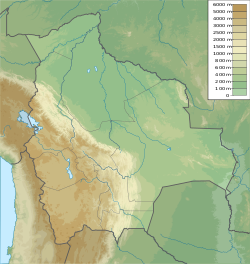| Irruputuncu | |
|---|---|
| Iru Phutunqu, Iruputuncu, Irruputunco | |
| Highest point | |
| Elevation | 5,163 m (16,939 ft)[1] |
| Coordinates | 20°43′55″S 68°33′08″W / 20.73194°S 68.55222°W |
| Geography | |
| Location | Bolivia, Potosí Department, Nor Lípez Province Chile, Tarapacá Region |
| Parent range | Andes, Cordillera Occidental |
| Geology | |
| Rock age | Pleistocene-Holocene |
| Mountain type | Stratovolcano |
| Last eruption | 1995[1] |
Irruputuncu is a volcano in the commune of Pica, Tamarugal Province, Tarapacá Region, Chile,[2] as well as San Pedro de Quemes Municipality, Nor Lípez Province, Potosí Department, Bolivia.[3] The mountain's summit is 5,163 m (16,939 ft) high and has two summit craters—the southernmost 200 m (660 ft)-wide one has active fumaroles. The volcano also features lava flows, block and ash flows and several lava domes. The volcano is part of the Andean Central Volcanic Zone (CVZ).
The volcano has been active during the Pleistocene and Holocene, with major eruptions occurring 258.2 ± 48.8 ka ago, between 55.9 ka and 140 ka ago and 1570 ± 900 BP (380 ± 900 AD), which were accompanied by the formation of ignimbrites. Historical volcanic activity is less clear; an eruption in 1989 is considered unconfirmed. Plumes linked to phreatomagmatic eruptive activity were observed on 26 November 1995 and 1 September 2003. Seismic activity is also observed on Irruputuncu, and ongoing fumarolic activity releasing 21–50 t/d (0.24–0.57 long ton/ks) of sulfur dioxide has left sulfur deposits in the active crater.
The Central Volcanic Zone is thinly inhabited and most volcanoes are not under reconnaissance, but Irruputuncu is watched by the Chilean SERNAGEOMIN geologic service. The possibility of geothermal energy production from the volcano has been examined.
